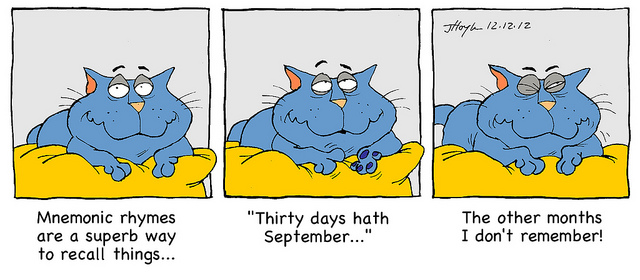The Truth About Effectiveness and Usefulness Of Mnemonics In Learning

Would you like to be able to memorize a whole book? What about those boring declination tables?
Silly question. Who wouldn’t?
One way or the other, you have heard of fantastic memory feats of mnemonists – memorizing decks of cards or thousands of digits. And all this seemingly effortlessly.
Mnemonics have the power to stimulate the imagination. They definitely stimulated mine.
This dream, the dream of being able to memorize anything I want, triggered the chain of events which made me embark on a bumpy journey/
Destination? To discover the actual effectiveness and usefulness of mnemonics and master my memory.
Effectiveness and Usefulness Of Mnemonics In Learning – My First Experience
What Are Mnemonics?
Before we move on, it’s good to explain what mnemonics are quickly. In short, mnemonics are devices to aid our overburdened memory.
They are used to facilitate efficient encoding by associating new information with the knowledge which is already stored in your long-term memory (Johnson & Weber, 2006 as cited in Gibson, 2009).
Probably the most common mnemonic device the so-called keyword method coined by Atkinson (1975). It is used to make meaningful auditory and imagery links to remember a word.
For example, if you want to remember that “to buy” in Spanish is “comprar,” you might create a vivid picture of a man who compares prices of products before the purchase. Not that complicated, right?
Let’s see now what science has to say about mnemonics.
Effectiveness and Usefulness of Mnemonics in Learning – an Overview of the Scientific Literature
There is a large body of research about mnemonics. However, probably the most interesting study up-to-date was led by Kent State University professor John Dunlosky and released in April 2013 by the Association for Psychological Science.
In a comprehensive report, the group of authors carefully examined ten learning tactics and rated them from high to low utility based on the evidence they’ve gathered.
If you are expecting mnemonics to be among the most useful strategies, don’t hold your breath. They didn’t even come close to the top of the list.
” According to the authors, some commonly used techniques, such as underlining, rereading material, and using mnemonic devices, were found to be of surprisingly low utility.“
Clearly, people with untrained memory would not be able to come close to these results. Still, the report says clearly – mnemonics might not be the best use of your time.
Of course, I must be perfectly honest with you. There are a lot of studies which show that using mnemonics might be very beneficial for (among others):
- memorizing names
- learning vocabulary
- learning math
What’s even more important, some studies showed memory improvement with students with disabilities, as described by Fulk (1994) and Bulgren et al. (1994).
And these are just a few of them and they all state clearly – mnemonics are statistically more effective.
Effective than what?! And why didn’t I include these studies here then?
Problems With Studies On The Effectiveness and Usefulness of Mnemonics in Learning
Having read dozens of studies on mnemonics, I can divide the flaws of these studies into the following categories:
a) Statistical sample is not representative
Do you know how to recognize bad, bullshit science at first glance? Look at the sample.
To generalize, any number below 100 participants means that researchers just threw your tax money into the gutter.
b) Control groups suck
Do you know what the usual control group against mnemonics-using students is? Rote learning students.
Ugh, it’s like watching some bizarre boxing match. “Ladies and gentlemen, let’s gather around to enjoy this very duel – a retarded shrimp vs. quite an ordinary shrimp.”
c) Laboratory settings
99,9% of these studies are conducted in laboratory settings. And there is quite a yawning gap between research in areas of everyday memory (i.e., field research) and lab-controlled research.
The Hawthorne effect is one of the things which comes to mind.
“A type of reactivity in which individuals modify or improve an aspect of their behavior in response to their awareness of being observed“
It’s tough to generalize such results to other settings
What’s more, so-called low ecological validity comes into play. The laboratory is clearly an artificial situation. People are directed by an ‘experimenter’ in a psychological experiment. They are removed from their natural social settings and asked to memorize different sets of data.
This is a very unusual experience that raises the question – how do this novel experience and settings really affect their behavior and memory?
Still, lab research is better than no research at all.
d) Time horizon
Most studies are conducted over a relatively short period. It’s rarely spread over more than 3-4 weeks. As you will soon read, this is why most studies prove the effectiveness and usefulness of mnemonics.
e) Nature of the tasks
Are mnemonics useless?
Am I saying that mnemonics are useless then? Not at all. They can be insanely useful.
But you must understand what they are and what they aren’t. I quoted the excerpt from John Dunlosky’s report for two reasons:
- 1) It tested different learning strategies against one another.
- 2) More importantly, it examined the effects of those strategies in LONG-TERM learning.
And this is what mnemonics are not.
They are not a suitable tool for long-term learning.
At least not in the form they are usually presented.
If you are not pressed for time, you can get by without any problems without using mnemonics.
They are also not a panacea for all your memory problems. It is just another tool in your learning arsenal.
If you have ever read anything by any author, who promotes/sells anything mnemonics-related, you might find it hard to believe. Don’t worry. I also felt disillusioned. And I had good reasons.
Effectiveness and Usefulness of Mnemonics in Learning – My Experiments

Picture by: Vlad
Inevitable drop in recall rate always came after more than four weeks.
And this is precisely why most scientific studies seemingly prove the effectiveness of mnemonics. They test them in labs in short periods.
Once again, I would like to stress that mnemonics can be immensely useful. Useful both for recalling random information as well as helping you achieve high levels of expert performance. Just not for long-term learning.
Read on, and I will show how they can be utilized best. But first, to have a full picture of what you’re dealing with, take a look at the limitations of mnemonics.
Limitations And Disadvantages Of Mnemonics
- Gruneberg (1998) argues that the keyword method, in general, is inferior to rote learning in the longer-term retention of vocabulary.
- “Campos and Gonzalez (2003) attribute ineffectiveness of the keyword method to participants ‘lack of training. They investigated in four experiments the effectiveness of the mnemonic keyword method using two groups of adults and adolescents. In all the experiments, the rote method was more effective than the keyword method for both adolescents and adults.”
- Some people (especially adults) are reluctant to create vivid images and crazy stories.
- Some people (especially adults) are unable and/or unwilling to resign from using previously learned strategies.
- Using mnemonic devices for memorizing words is time-consuming (especially at the beginning).
- Using mnemonics requires more effort (especially at the beginning) than rote-learning.
- Mnemonics don’t guarantee understanding.
- Learning with mnemonics lacks context.
So if mnemonics are not an excellent way for long-term learning, what are they good for?
How Mnemonics Affect Your Short-Term Memory
Short-term memory has three key aspects:
- 1. limited capacity (only about 7+-2 items can be stored at a time or 3-4 chunks)
- 2. limited duration (storage is very fragile, and information can be lost with distraction or passage of time)
- 3. encoding (primarily acoustic, even translating visual information into sounds).
And here is where the true power of mnemonics lies.
Mnemonic devices allow you to boost all these three aspects of your short-term memory significantly.
It might not seem like a big deal, but it has tremendous implications for your (language) learning.
Why?
Because short-term memory is a necessary step toward the next stage of retention – long-term memory, you can treat short-term memory as a bottleneck of your learning. After all, if you can’t commit some information, even just for a few seconds, to your memory, how are you supposed to learn?
Some researchers claim that working-memory capacity reflects the efficiency of executive functions. In other words, the ability to maintain and manipulate information in the face of distractions and other irrelevant information. ( Engle, R. W., September 1999).
That’s why the best way to think about mnemonics is to treat them as a relatively long-lived external memory with huge capacity.
I will get to the most effective use of mnemonics in a second. First, I want to demonstrate something. Let’s take a look at prodigies.
The Short-Term Memory Of Prodigies
Studies on the prodigies who reached professional-level performance in their domain (e.g., art, math, music) by the age of 10 show something very interesting.
When Psychologist Joanne Ruthsatz and violin virtuoso Jourdan Urbach administered an IQ test to nine prominent child prodigies (…) there were a wide range of IQ scores among the eight prodigies (from 108 to 147), and their cognitive profiles were uneven.
It turned out that the key to understanding their rapid learning in their domain was not their global intellectual functioning.
Most strikingly, every single prodigy in their sample scored off the charts (better than 99 percent of the general population) in working memory — the ability to simultaneously store incoming information while processing other information.
So how can you approach these levels of intellectual functioning?
Key Information Needed to Understand How To use Mnemonics Effectively
1) We learn best by doing
2) Calling information to mind strengthens it and helps in future retrieval
3) Understanding the difference between procedural and declarative knowledge.
According to Cohen and Squire (1980):
Procedural knowledge involves “knowing how” to do things. It includes skills, such as “knowing how” to play the piano, ride a bike; tie your shoes and other motor skills. It does not involve conscious thought (i.e. it’s unconscious – automatic). For example, we brush our teeth with little or no awareness of the skills involved.
Declarative knowledge involves “knowing that”. Knowing names of plants , dates, formulas – it’s all part of your declarative knowledge. Recalling information from declarative memory involves, so called, effortfull recall – i.e. information has to be consciously brought to mind and “declared”.
Knowing these things can help us stew perfect learning mix:
- 1) Gather information
It doesn’t matter whether you want to learn a language or how to master persuasion strategies. Gather the knowledge needed to achieve your goal.
- 2) Memorize it with mnemonics
As I have written before, mnemonics can be treated as an extension of your short-term memory. Place as much information as you can on this external “hard-drive.”
- 3) Start practicing right away
You know the theory of how to play the piano or how to program. It’s high time you started putting your knowledge into practice. Try to use as many pieces of information from your memory as you can.
Because every time you bring one of them to your mind, the magic happens. You start creating and strengthening neural networks responsible for the given action.
Repeat this action a sufficient number of times, and you will automate it. From that moment on, you will be able to perform it subconsciously and with minimal effort.
Let’s see how you can use it in language learning.
Effectiveness and Usefulness of Mnemonics in Language Learning

Picture by: Shannon Kokoska
When I launched my Czech mission, I already had a rough plan of how to achieve my desired level in record time. This is more or less what I did:
- 1) I got familiar with grammar
- 2) I memorized basic declinations and conjugations with mnemonics
- 3) I memorized about 50 essential words with mnemonics
- 4) I started producing a lot of sentences by talking to myself and by using the words and mentioned above
- 5) I “rinsed and repeated” points 2-4. Each time I increased the number of words and grammar constructions
Of course, there was also listening and reading practice. If someone asks me what the quickest way to learn a language with mnemonics is, I show them this plan. I also tell them to use ANKI or combine those strategies.
Either way, since learning with mnemonics lacks context, I would avoid using it for language learning unless you can produce lots of sentences with the vocabulary you have memorized this way,
Since we have established that mnemonics can be treated as your external memory, take a look at other practical applications of mnemonics!
(Other) Practical Applications Of Mnemonics
Mnemonics are useful whenever you need to memorize a lot of information on the fly and remember them for at least a couple of hours.
That’s why you can use them (among others):
- During parties and meetings to memorize names and information about other participants
- during last-minute panic before the exam or company presentation to make sure that the data stays in your memory!
- During speeches.
- to impress your wife and show her that “you don’t need no damn shopping lists” to remember what you should buy
- to memorize random information which emerges during conversations
And so on. I think you got it!
Effectiveness and Usefulness Of Mnemonics – Summary
Done reading? Time to learn!
Reading articles online is a great way to expand your knowledge. However, the sad thing is that after barely 1 day, we tend to forget most of the things we have read.
I am on the mission to change it. I have created 30 flashcards that you can download to truly learn information from this article. It’s enough to download ANKI, and you’re good to go. Memorize, among others, what working memory is, what are limitations of mnemonics, and much more!













Hello Bartosz! First of all thank you for your all informative and useful articles. I think I must have read through almost all of them. They are really helpful 🙂
I have a question about the mnemonics of creating a story (also known as chaining) using a group of new words for learning (5-10 words). I try to add a little bit of craziness to the story as that helps me remember better. I have also attached sentences to each word as context. When I actively recall the words during my review every few days, I also recall those sentences.
After 3 weeks, I still remember and am still able to recall all the vocab by just recalling the beginning of the story (the trigger).
However, I have some doubts about whether vocab memorised in such a manner is useful in practical situations, eg when it comes to speaking).
Based on your experience or knowledge, does this form of “story mnemonics” help when it comes to actually “using” the vocab, or will our brain tend to be over reliant on the “story” such that we are unable to recall unless we go through the story in sequence?
In short, will there be a discrepancy between memorising vocab and actually putting it in use?
Thank you for any insights!!
Hi! My pleasure! Although I am not sure why you’re asking the question in the article where I clearly state that there is such a discrepancy. It’s easier to memorize and harder to recall 🙂
Thank you for your response Bartosz.
Sorry for any confusion.
I asked the question specifically because I find that even after having successfully memorised words, when it comes to actual conversations in the real world, many times I’m not be able to recall those words I have memorised.
So I was wondering if using crazy stories to memorise words is useful at all when it comes to transfering to real life usage 🙂
It’s like studying just for exams (theory), but don’t know how to use the knowledge in real life (practical)😅
Could it be because the memorised words have not become “second nature” yet? (I.e. just continue reviewing and overlearn)
So sorry if my question is confusing 🙁
I also wonder about the same point.
Is using mnemonic story effective when we need to transfer it to real world use?
Because we need to recall the story every time when using the vocab.
Any thoughts on this Bartosz?
Excuse me you said that mnemonics only help in recalling in 2 to 4 weeks. But the man memorized the Chinese dictionary after 6 months recall.
I am currently a high school student. I three years ago in geography memorized the five great lakes of North America by the acronym HOMES (huron, ontario, michigan, erie and superior) and the minerals of Canadian shield which I still remember. Please explain my doubt.
Hi! It’s simple. You can hold a big amount of information in your mind for a long time simply by reviewing it multiple times per day.
As you can see from his presentation, he can’t access this information quickly. What’s more, holding information in your mind doesn’t equal being able to recall it in a relevant context. I hope that’s much clearer now.
Surprised I didn’t read this post earlier.
My personal anecdotical experience seems to back up your claims. I did spent hundred of hours learning vocabulary on Memrise using mnemonics, somehow storing them in my “extended” short-term memory. It is only when I started using them while doing writing or reading exercises that I had several “aha” moments where I would suddenly recall one of these old words (that I never really used in context) and get them into my active memory.
So, mnemonics on SRS software, yes, as long as you complement it with more active learning to actually use them.
Yes, if somebody insists on using mnemonics then I would recommend doing them, for example, ANKI and making sure that vocab is used actively. 🙂
THank you for your comment!
Thanks for your answer. It makes perfect sense.. and of course you’re right. It wasn’t your claim that rote learning is better than mnemonics.
You are very welcome!
Thanks for a great article. I do have a few questions:
1. When you say that mnemonics are less efficient than rote learning when it comes to storing things in your long term memory, how do you mean it?:
To store something in the long term memory you need two steps:
1. From not having memorized to having stored it in the short term memory &
2. From short term memory to long term memory.
That makes me think of at least 3 possible comparisons:
1. Rote learning + rote learning vs. mnemonics + nothing
2. Rote learning + rote learning vs. mnemonics + mnemonics
3. Rote learning + rote learning vs. mnemonics + rote learning
(1.) Seems like an ‘unfair’ comparison unless the point is to point out that mnemonics aren’t magic.
(2.) Would be like remembering a route to remember another route to rember a subject! Rather tedious it seems.
(3.) This one would seem to fail to explain why something being better stored through mnemonics in the short time memory would not also be best stored in the long term memory. Is this due to a difference in the art of repetition – as in do i repeat the subject or the keywords etc.?
Im not doubting your points, but im not really sure what we are comparing.
Thank you for your comment Temmy!
I hope I am not mistaken but I can’t recall suggesting that rote learning is better than mnemonics. I definitely think that mnemonics are better. My problem is that mnemonics are almost always tested against rote learning which doesn’t make much sense. There are literally dozens of other strategies mnemonics can be tested against.
Here is an interesting fragment from one of recent (hyped) studies about mnemonics:
“When memory athletes are fooled — by being told they won’t be tested on a list of words and then getting quizzed by researchers anyway — they don’t perform much better than average, said Konrad, who is continuing to study his fellow memory athletes.” – http://kdvr.com/2017/03/08/hack-your-brain-to-remember-almost-anything/
As for other points
1) Yes, the point is to show that mnemonics aren’t magical. And once again – comparing mnemonics with rote learning doesn’t really make much sense.
2) It is!
3) It actually explains it pretty well. Generally, we have two kinds of rehearsals – passive and active. Passive rehearsal serves only to maintain the immediate availability of the information. Very much like repeating a phone number over and over again to not forget it. And science has known for quite a long time now that:
“passive rehearsal through repetition has very little effect on whether or not information is later recalled from long-term memory (Craik & Watkins, 1973).”
If you want to transfer information to the long-term memory, you should focus on elaborative rehearsal processes and create the frame of reference for the information you are trying to learn,
Don’t worry, I am always willing to accept criticism or face doubts – that’s how we learn!
Hope that helped!
Great post and very informative! I am currently writing a dissertation on a similar subject. However, to research more thoroughly I was wondering whether you would be able to name the books, articles or journals to some of the authors that you are referring to?
I think that I have been able to find some of them already but as the titles are not mentioned at the end of the post it has been difficult to locate them.
Any help would be much appreciated.
Thank you! I have sent you an email 🙂
While reading your article i remembered my first (use of) mnemonic (phonetical numeral alphabet).
Good memories I hope! 🙂
What about learning something and bypassing the short term memory and using long term memory? Like, paul scheele course, photoreading? Or zox pro? Or there is Or there is pmemory? Have you looked at these courses?
Bypassing the short-term memory in learning seems highly unlikely. So far I haven’t seen any reliable source of information which proves it to be true.
As for any course which promises you to read xx thousand words per minute – stay away from them. I can’t stress enough how scammy that is.
And as for pmemory – these are just ordinary memory techniques which you can find in any book, or my website, for a fraction of the price or for free.
Here is more about pmemory – http://mt.artofmemory.com/forums/phenomenal-memory-good-or-bad-2318.html .
Thanks a lot for this article! Lots of interesting information you covered here so I believe it really helps 🙂
I hope it will! Thank you for your comment and good luck! 🙂
You’ve just convinced me to look into mnemonics and try to utilize it as I study Spanish. I’m at an intermediate level and, after reading your article on the thousands of words it takes to move from 95% comprehension to 98% comprehension, I’ve started to try to crank out large quantities of new vocabulary. If mnemonics can help me do that, I’ll be putting them to the test.
I’m thrilled to hear it. It’s really worth the time, if you remember how to use them correctly! 🙂
Make sure to let me know about your progress! 🙂
Thank you very much for this interesting post. There is really a lot of food for thought in it!
Keep up the good work!
Thank you! And as for your correction – my mistake! I changed the comparison! 🙂